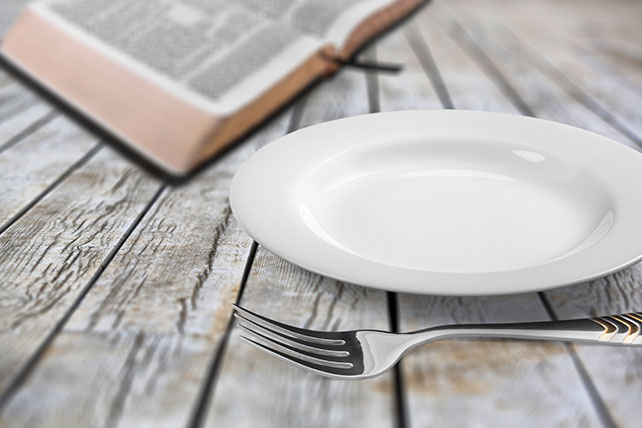2. Commit to a Time Period
For beginners, fasting for one meal is a good place to start. You might, for example, eat a light breakfast and dinner but fast for lunch. Another option is to fast from Saturday evening to Sunday morning, breaking your fast with Holy Communion. Many Christians practice this type of fast year round.
During Holy Week, some people fast from Palm Sunday to Good Friday. But as a starting point, I suggest you begin a fast on Maundy Thursday evening and continue through Good Friday. You might break your fast with light food at 3 p.m. on Good Friday, the time Jesus breathed his last on the cross.
3. Consider Liquids
For most fasts, it’s advisable to consume some liquids. Water, of course. For a longer fast, some juice (no added sugar, and heavily diluted with water). Vegetable broth or herbal tea are other options, again without sugar and diluted with water.
Avoid caffeine and alcohol while fasting. However, if you anticipate a caffeine headache, you may wish to drink a small amount of coffee or tea. Remember, a fast should not be debilitating or self-abusive.
4. Avoid Television
Food features prominently on TV, especially commercials. So if you decide to watch TV, beware. On the other hand, you might also fast from media, electronics, or noise.
5. Exercise
I recommend continuing your normal exercise routine. A student of mine who taught aerobics wondered if she should cancel classes during her fast. I suggested she keep her schedule, and she was able to complete all her classes. Again, fasting involves dependence on God. He will provide the energy and strength you need.
6. Pray During Hunger or Weakness
At some point, you’re likely to feel hungry and/or weak. This may be the time to tap into solidarity with people who are without food. Also, this is a time to come back to trust and dependence on God. You might pray, “Dear God, give me the energy beyond my own physical state at this time.”
In essence, this is a definition of grace. As human creatures, we have limits. But with grace, we appeal to power that comes from without as opposed to within. In other words: Grace is something good I need that I cannot give myself.


